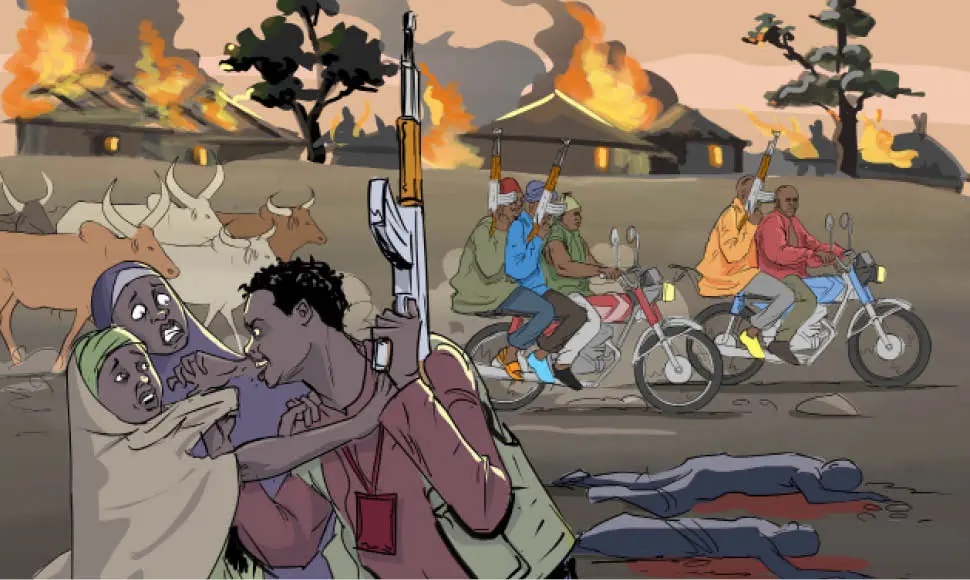by Chidozie Acholonu
Across Nigeria, the recurring commentary has been the concerns over terror and insecurity perpetrated by non-state violent groups. In the North East, Boko Haram and affiliated jihadists are waging a high-level insurgency that has claimed thousands of lives and displaced millions; gangs of gunmen called, ‘bandits,’ are killing and kidnapping hundreds of civilians and children in the North West. And in the North-Central, South West and North-West killer herdsmen are running amok on a killing and kidnapping spree. Then in the South-East and South-South unknown gunmen, suspected to be from the Eastern Security Network or ESN (from the Indigenous People of Biafra), are brazenly attacking security installations and killing law enforcement and military personnel.
- Malami: Prominent Nigerians financing terrorism will be prosecuted
NPA debacle: Hadiza Bala-Usman faces panel over N165.3bn ‘unremitted’ funds
So the question then is, can Nigeria win the war on insecurity against violent armed groups that skillfully exploit our security gaps and divisions as a country? And the answer is yes we can, if, we adopt a “Grand Strategy.” Peter Layton defined Grand strategy as “the art of developing and applying diverse forms of power in an effective and efficient way to try to purposefully change the relationship existing between two or more intelligent and adaptive entities. Grand strategy is now a distinctive, stand-alone expression. Grand strategy can no longer be confused or conflated with others such as statecraft, foreign policy, or even strategy.”
In adopting a grand strategy, Nigeria must first clearly define its objectives for winning against the adversaries being fought. This means that a one size fits all cannot be applied against the different groups Nigeria is fighting. To succeed, the Nigerian government needs to understand the adversaries, their principal weaknesses and their strengths in relation to its strengths and weaknesses. This will require Nigeria to quickly conduct a nationwide threat assessment, to determine the overall threat landscape, root causes, the actors, weaknesses, gaps, strengths of the adversaries and Nigeria, as well as remedies moving forward.
Second, the Nigerian government must adopt a comprehensive whole-of-nation approach to counter the activities, change the narratives from their adversaries and win the hearts and minds of the people. This requires mobilizing all the influential and respected people in the country, across the ethnic groups, to work with the federal and state governments to proffer inclusive solutions, including amending the constitution to create state constitutions and targeting development activity to the most vulnerable groups and communities, irrespective of ethnicity. Maintaining schemes that address poverty, a prominent example being the COVID-19 cash schemes and agriculture schemes. These measures are very popular and must be done as a matter of time and urgency.
The third part of the grand strategy involves allocating a higher percentage of GDP to defence and security by increasing the armed forces and law enforcement budget. Increasing the security and defence budget will allow the Army, in particular, to expand from 100,000 to 500,000, while the police can expand from 350,000 to 1 million, with the right recruitment drive and investment. The capacity of the country to counter internal security threats can also be increased, by developing state guards (vigilantes), manned by trained armed villagers to reinforce the security forces with their numbers.
To sustain the manpower required, significant investment in resources must be made to increase the salary, welfare, healthcare and housing needs of the recruits. The government would also need to appoint an independent watchdog with subpoena and sanction power to oversee the budget expenditure to avoid corruption. These measures would significantly boost the morale and patriotism of the nation fighting men and women.
Offensive operations would then be conducted using Harass, Deny, Contain and Destroy (HDCD) tactics, intended to find, attack, capture or destroy and seize territory from terrorists, bandits and insurgents wherever their cells and territories exist. This is called “defence-in-depth,” intended to neutralize the ability of these groups to undertake brazen attacks against security installations and vulnerable civilian targets, while somehow managing to disappear and strike again.
In these operations, small, well-trained, highly mobile Special Forces groups with embedded local guides will be key. The Special Forces will be well trained and authorized to use drones to call in precision air, artillery and mortar strikes against the hideouts and bases of the violent actors. They will infiltrate into the area of operations of the armed groups to constantly harass and attack high-value targets, provide real-time intelligence and disrupt their lines of resupply and communication.
The grand strategy will allow the Nigerian government to maximize its strengths and take back the initiative. In short it will make the job of non state actors as hazardous and as unattractive as possible while returning strategic advantage to the government. Indeed Nigeria is confronted with a stark reality and to succeed Nigerians must be clear-eyed that the grand strategy will require great sacrifices today to win tomorrow.
Chidozie Acholonu works at the Institute for Peace and Conflict Resolution, Abuja, Nigeria

 Join Daily Trust WhatsApp Community For Quick Access To News and Happenings Around You.
Join Daily Trust WhatsApp Community For Quick Access To News and Happenings Around You.


